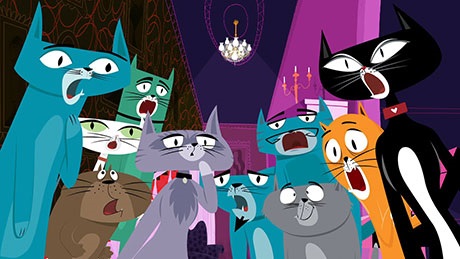‘Kitty is Not a Cat’ was commissioned by the Seven Network.
Amid ongoing debate over local content quotas, the Seven Network has threatened to halt the production of children’s programs, raising the ire of producers.
Earlier this week, the Sydney Morning Herald and The Age reported that Seven had advised the Federal Government of its plans to halt production following the posting of $66 million half year loss.
The move follows longstanding calls from all commercial free-to-air networks for the children’s quotas to be scrapped, arguing they are outdated, restrictive and no longer serve audiences.
Seven CEO James Warburton told the Nine papers: “We’ve been clear for a long time that the children’s content quota was not a sustainable one for us and the wider commercial television industry in Australia.
“The substantial cost in producing this content, which in some instances is watched by such a low number of viewers that it falls under ratings measurement thresholds, further handicaps us against unregulated, foreign digital platforms.
“We remain in compliance with children’s quotas but it is clear, and has been for some time, that we need immediate action not more reviews and delays.”
Nine CEO Hugh Marks has supported his rival’s move, also stating in the Nine papers: “I’ll have to consider the same thing because to continue to expend our money and taxpayers’ money on making content for which there is no audience makes no sense.”
Currently Seven, Nine and 10 are obligated to produce 96 hours of first-run Australia C drama (for children older than pre-school age) over a three year period, and at least 25 hours per year. Additionally, these networks must screen a combined total 260 hours of C programs, and 130 hours of programs aimed at pre-schoolers.
Local content obligations do not apply to SVOD competitors such as Netflix or Stan, a fact that FTA networks argue puts them at a disadvantage.
Last year, in response to the ACCC Digital Platform Inquiry, the government committed to a staged process of media regulation reform, culminating in “platform-neutral regulatory framework covering both online and offline delivery of media content.”
The government stated at the time that its immediate focus was to look at the content obligations on FTA broadcasters, and whether there should be local content requirements imposed on SVOD services.
Screen Australia and ACMA are currently drafting an options paper for the government, which is expected to be handed down by April.
Today, Screen Producers Australia (SPA) hit back at “pressure tactics” from Seven, with CEO Matthew Deaner stating any FTA broadcasters looking to evade obligations or pressure government and the broader industry was disappointing, arguing children’s content plays a critical role in the production and viewing ecosystem.
“In an age of abundance where so much content is available to everyone, everywhere, first-run broadcast numbers for all types of content are in decline. However, well made and well marketed children’s content in particular has a lengthy currency with strong second and third run repeat audiences and alternate and online platforms, not to mention international sales in hundreds of foreign territories. A thoughtless removal of quotas would act as a reward to what has been a steady decline in investments, promotion and marketing of quality Australian children’s content and destroy so much of the ecology of the sector,” he said.
“The ACMA has previously reported that the spend on all children’s content (Australian and foreign) is traditionally around 1.5-1.6 per cent of total programming expenditure for the commercial free-to-air broadcasters with new Australian production being about a third of this (about 0.5 per cent). Therefore, while halting production of this content will result in only minimal savings for the broadcasters it will have a much greater negative effect on the small businesses which not only export our unique stories to the world but also support thousands of jobs and generate substantial production revenue here in Australia.”
Rather than scrapping quotas, SPA wants the government to “evolve” content obligations so that there is “a platform neutral, level playing field for all that reflects the relevant differences but brings all players into a comprehensive system to ensure that those who benefit from our content creation and distribution systems also contribute to them.”
In 2017, local content quotas were also a consideration of the Australian and Children’s Screen Content Review, also conducted by Screen Australia, ACMA and the Department of Communications and the Arts. The government never released the review publicly.


